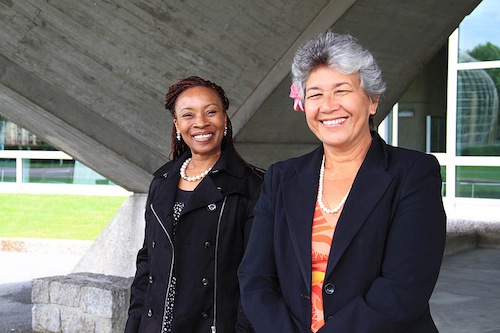
Ms. Catherine Ngugi.. and Letuimanu’asina Dr. Emma KRUSE VA’AI / Mariana Bittencourt / CC BY
Through the generous support of the William and Flora Hewlett Foundation and in full partnership with the Commonwealth of Learning (COL), UNESCO hosted the 2012 World Open Educational Resources (OER) Congress last week to:
- showcase the world’s best practices in OER policies, initiatives, and experts;
- release the 2012 Paris OER Declaration calling on Governments to support the development and use of OERs; and
- celebrate the 10th anniversary of the 2002 UNESCO Forum that created the term “OER.”
I am pleased to report UNESCO member States unanimously approved the “Paris OER Declaration” (pdf).
This Declaration is the result of a yearlong process, led by UNESCO and the COL with regional and online meetings and final negotiations at the Congress. The Declaration recommends UNESCO member States:
-
a. Foster awareness and use of OER.
b. Facilitate enabling environments for use of Information and Communications Technologies (ICT).
c. Reinforce the development of strategies and policies on OER.
d. Promote the understanding and use of open licensing frameworks.
e. Support capacity building for the sustainable development of quality learning materials.
f. Foster strategic alliances for OER.
g. Encourage the development and adaptation of OER in a variety of languages and cultural contexts.
h. Encourage research on OER.
i. Facilitate finding, retrieving and sharing of OER.
j. Encourage the open licensing of educational materials produced with public funds.
The Declaration will now be delivered to UNESCO’s Director General. She will submit the Declaration to the UNESCO Executive Board on October, 2012. After the UNESCO Board approves the Declaration, it will go to the General Conference for final approval. While it is important to note a “Declaration” is a non-binding UNESCO instrument, a UNESCO declaration does “set forth universal principles to which the community of States wished to attribute the greatest possible authority and to afford the broadest possible support.”
OER Congress resources
- UNESCO Congress site
- Paris OER Declaration (pdf) (Français pdf)
- #OERcongress (twitter feed)
- COL Congress site
- Regional meetings that refined the Declaration and educated regional States about OER and open licensing
- Congress photos
- US Mission to UNESCO article
Bravo to all who helped move the world to this moment! So many open advocates traveled to the regional meetings and to the Congress. Your contributions and work with your governments led us all to this successful outcome.
Lawrence Lessig’s Keynote (added 27 July, 2012):







I do not know what to say… in review of the process and in light of your comment congratulating so many advocates who traveled to the regional meetings… well I am left with a bad taste in my mouth as I know first hand the reality. For months in advance I attempted to get information on the Asia regional meeting in Bangkok. To finally learn that it was not an open meeting of advocates, instead it was a highly closed meeting of friends and more friends. It was impossible to attend the regional meetings without a special invite, and that meant you must be a friend of the organizers. To me that is exactly the process that we cannot accept and promote in OER. I checked with colleagues at the Latin American meeting and found it was a bit more open than the Asia meeting…
I say shame on congratulating this declaration as a culmination of open practices when in fact it was an inside job. The declaration is a beautiful work indeed, yet the process of getting there was highly disfranchising and disgraceful in my humble opinion.
So there you have it…
Cheers
Tim
This is a very good achievement and all the advocates should be commended for their unceasing desire and effort.
Good news, Cable. Thanks for your hard and consistent work.
… judging from the photos of the meeting, you must have been busy pinning on all those CC lapel pins
Congrats to all who worked to get the 2012 Paris OER Declaration approved. I retweeted. And thank you for the concise update, Cable.
Best,
Ingrid
Congratulations Cable! This is a great step forward.
Best regards,
Rafael
While this brings a bit of attention to OERs, and to some of the measures needed in order to encourage their use, the actual agreement is meaningless political posturing. There are no commitments here to any form of implementation, curriculum development integrating computers into education, research, or discussing these idea with the peoples of the countries involved.
@ Tate, Eric, Ingrid, Rafael: Thank you. Now the hard work begins of helping governments learn about and adopt open policies: so publicly funded resources are openly licensed resources.
@ Edward: As with most IGOs, UNESCO has a number of “standard setting instruments” it can use to advance ideas (such as OER): http://portal.unesco.org/en/ev.php-URL_ID=23772&URL_DO=DO_TOPIC&URL_SECTION=201.html
For this Congress, UNESCO opted to start with a Declaration. You are correct in that Declarations are not subject to ratification. Nevertheless, the adoption of the Paris OER Declaration gives UNESCO’s members nations a guide, and an official document to reference as they engage in national and regional OER efforts.
@ Tim: I agree – open is at its best when all is open – including the meetings.
I’m sorry you had trouble getting an invitation to the regional meetings. I’m afraid I don’t have any detailed info to give you about why as Creative Commons did not organize the meetings.
My hearty thanks to all 2012 Paris OER Declaration participants, who invested their time and efforts. thanks!